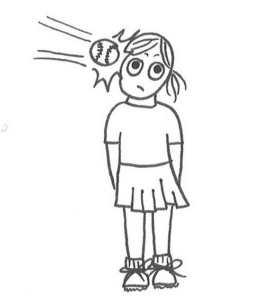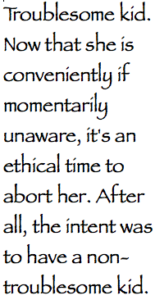

Article at National Right to Life News by editor Dave Andrusko*
When happens to “altruism” in the hands of a pro-abortion absolutist
I suppose there only so many pro-abortion iterations. You can, for example, just simple admit that annihilating an unborn child is an exercise in “autonomy” that is so fundamental to a woman’s very being it is an action beyond being judged.
Or you can insist that in a sense you are doing the baby and/or any other children a favor. A common refrain, that never ceases, is that “better dead than unwanted” or the woman will not do as good a job mothering her other children if she is ”forced” to continue a pregnancy she doesn’t want.
Then there is this interesting if typically misguided ploy I once ran across in a letter to the editor of the Des Moines Register which periodically I revisit. It is the announcement that they, in their ingenuity, have a found a way out of the typical abortion debate, which always includes sacrificing the unborn child anyway.
The letter writer was praising the newspaper for running pro-life and pro-abortion point/counterpoint.
The letter writer eviscerated the pro-lifer’s contribution and elevated the pro-abortionist (a “professor emeritus of biology at Drake University”) to the pantheon of the High and the Mighty.
Intrigued, I went back and read Prof. Gene A. Lucas’s contribution in his op-ed, “Altruism: A different focus on abortion.”
Prof. Lucas said there can be no “win-win” solution in the usual pro-and-con on abortion, so how about introducing a discussion of “altruism”?
Both sides have “altruistic” arguments for their position, he maintains. Naturally, he frames the pro-life argument in a manner that he can’t lose: “In an altruistic sense it is understandable that the elimination of a fetus should be prevented if one believes it has the properties of a sentient being. I believe a reasonable argument can be made that it does not.”
By this formulation, since nobody can argue that a pregnant woman is not “sentient” (self-aware), altruism can only be applied to her–and so much for the debate.
But talk about begging the question! Is being “sentient” the only issue on the table? Put another way does it tell us anything ethically and morally relevant? Does it threaten to open the door (for most people, but clearly not Prof. Lucas) to a whole host of unintended consequences?
Consider how Lucas reasons. He acknowledges some traditional early biological markers for the purposes of (a) concluding so what?; and (b) applying his lethal logic to human beings out of the womb:
It is well established that legs can kick and hearts can beat, but the critical feature is that the brain, while forming and gaining experience, has not reached the level of self awareness. It is not fully functional until it becomes cognizant of itself, and recognizes what is happening to the point that it can react to its surrounding stimuli. This progression to full consciousness does not happen during fetal life and until after birth. [My underling.]
That is the only marker that matters – certainly the only marker that matters to Prof. Lucas: full consciousness which by the way, just to repeat, is not accomplished “until after birth.”
So, to summarize, there is no obligation—zero obligation– to consider “altruism” at any stage of fetal development. This is why hard-core pro-abortionists always, always, always wind up infatuated with infanticide, aka Alberto Giubilini’s and Francesca Minerva’s famous essay, “After-birth abortion: why should the baby live?”
Lucas’ argument is a fraternal twin to Giubilini‘s and Minerva’s. Reduced to its essence, it is that any justification you could offer for abortion (that is, pre-birth) applies equally well post-birth.
Why? Because (they maintain) “The moral status of an infant is equivalent to that of a fetus in the sense that both lack those properties that justify the attribution of a right to life to an individual.”
In Lucas’ case, the missing “attribute” is sentience/self-awareness/full consciousness.
By the way, if the ability “to react to its surrounding stimuli” is a hallmark of full consciousness, then what happens if we anesthetize the newborn or the baby who is three months old? For that matter, how about the annoying old person whose health care costs are eating up the inheritance?
We get a whiff of that in Lucas’ op-ed:
One might compare the fetal brain to that of an adult who is anesthetized. Pain stimuli may be present and reflexes may occur, but if the brain doesn’t consciously recognize them pain isn’t experienced. It doesn’t seem reasonable to equate the pain experience of an unfinished brain with that of the fully operational one of its mother.
Unless, of course, you have anesthetized the mother.
Last thought. As Margaret Somerville reminds us, Giubilini and Francesca “explain they’re interested in this question because of a study that shows not all babies with Down syndrome are identified and aborted prior to birth, a failure they propose can be remedied through legalizing infanticide.”
Some will escape what Dr. Gerard Nadal called the “genetic submarine net.” What Dr. Nadal said of Giubilini and Francesca essay that appeared in the Journal of Medical Ethics eight years ago is apropos of Prof. Lucas’ contribution to the Des Moines Register: “A fascinating and profoundly disturbing read into the process of malevolent apologetics.”
*cartoon not part of article
